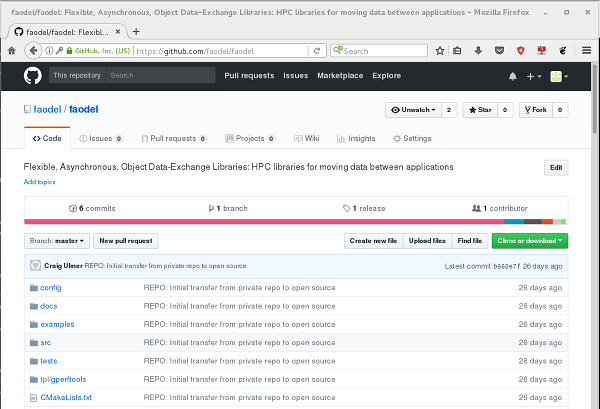FAODEL 1.1803.1 Release
I'm pleased to announce that we've officially open sourced and released FAODEL (Flexible, Asynchronous, Object Data-Exchange Libraries) on Github. The 1.1803.1 version is a snapshot of all our libraries: Kelpie (a key/blob service), Obbox (an async comm engine), Lunasa (a network memory management unit), NNTI (an RDMA portability library from Nessie), and Webhook (an in-app http server for interacting with your app). It's been copyrighted by NTESS and we've received permission to open source it from the Department of Energy under the MIT license. We even show up in DOE Code now.

This was the first time I've done an open source release at work, so it was an adventure figuring our what we had to do. The initial step was just getting all of our code together in one repo we could export. We wound up merging several repos together and refactoring the build system, which made the whole thing easier to use. We then ran our tests over and over on different platforms until the code was in a stable form that ran everywhere. Once all of that was in order, we started through the legal parts of the release process.
Legal Process
In order to release the software we needed to declare the license we were going to use and do a copyright assertion. My initial instinct with the license was just to do the MIT license since it's simple and open. When I talked it over with the group though, I started to see how the protections provided in other licenses (eg BSD or Apache) might be better for us. The discussions dragged on and got more complicated (at one point someone even roped in a prof at UCSC). I eventually got fed up and decided to go with my initial instinct- I just want people to be able to use the software, so the MIT license is just fine.
The next step in the legal process was figuring out the right way to insert the NTESS copyright message. I see a lot of code these days where they stamp both the copyright and the full license on the top of every source file. It drives me crazy because I hate scrolling through code just to figure out what the API calls are. I read that adding all this junk is not necessary from a legal perspective if you have it all documented in the top directory. However, one of my developers noted that he does appreciate seeing a legal note on the files so he knows where it came from after installation. I agreed that this was useful, and wrote a script to prepend all our source with the 3-line copyright our legal people asked us to put. I also had to mark up directories for third-party libs (eg tcmalloc) that we include but are not the original authors.
Next, I had to do a code review with a reviewer to make sure that nothing bad was going into the release. This linting process meant going through all the code and determining whether there was anything sensitive that could cause problems. In addition to the things I'm used to looking for in these reviews, we had to look for crypto-related things because an open source release has to be treated as an international export. Interestingly, the fact that we reviewed the code got it marked as an export controlled item. For a few weeks there we were technically rated as EAR99, the lowest export control they can place on something. Fortunately, after everything cleared in the process we were changed to a publicly releasable code with no export issues.
DOE Approval
After all the signoffs, the lab submitted the release request to the Department of Energy for approval. The DOE has very positive policies for open sourcing software, so it wasn't much of a surprise that they OK'd NTESS's copyright assertion and open source release of this software. One of the perks of having DOE be involved in the process is that they route your info into gov code databases like DOE Code. According to one of the talks at the ECP meeting this year, we're supposed to be assigned a universal DOI record at some point. We're in the system now, but it doesn't look like the DOI has happened yet.
In any case it's great to be done with the release. I'm not expecting other people to use it, but at least we've got a placeholder now.
Code
The code is now hosted at github:
github:faodel/faodel v1.1803.1